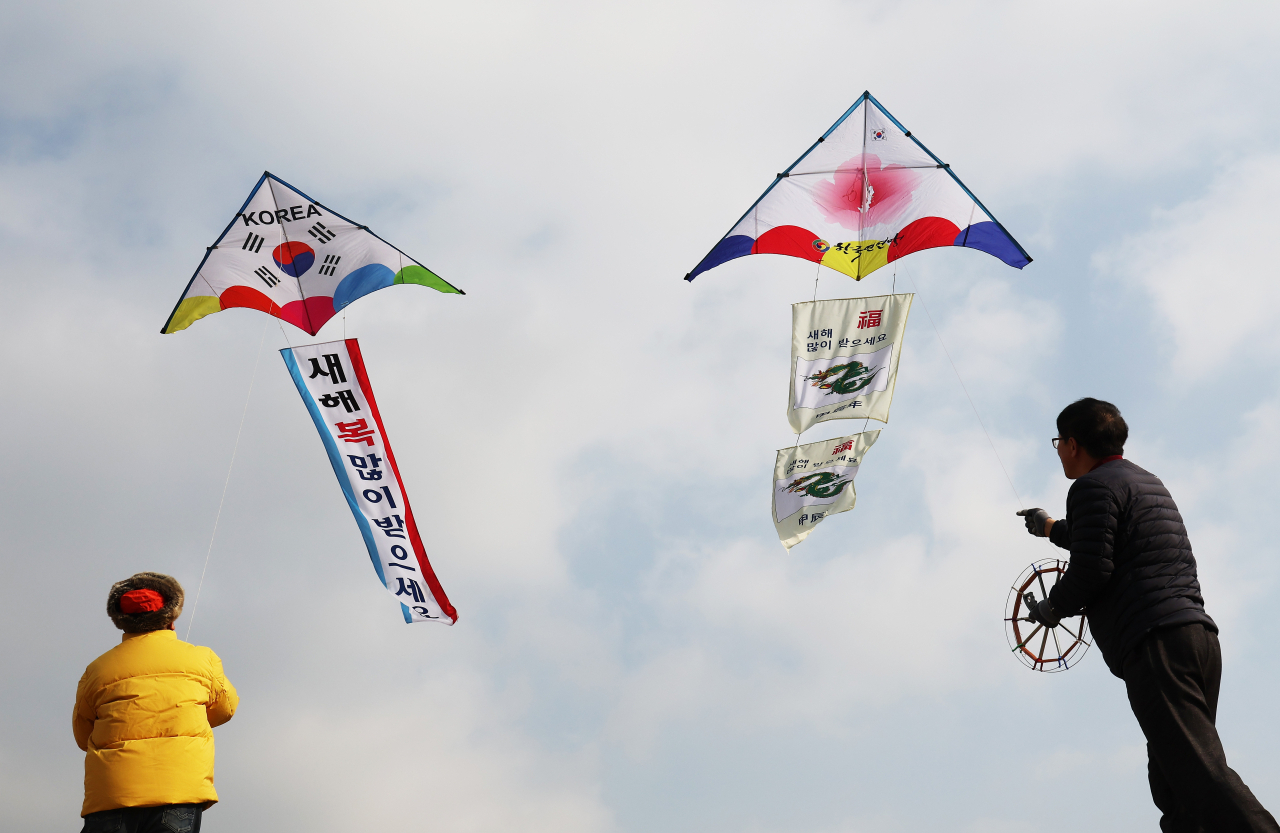 |
People fly kites with New Year's greetings and drawings of 2024's blue dragon to commemorate the upcoming New Year at Changryongmun of Suwon Hwaseong Fortress on Thursday. (Yonhap) |
As 2023 draws to a close, the Korea Meteorological Administration forecast on Friday that most of South Korea will see either snow or rain over the weekend.
According to the KMA, snow or rain is expected to fall in most parts of the country on Saturday and Sunday, as low pressure passes through.
The central parts of the West Sea, western Seoul and northern South Chungcheong Province are expected to be hit with the first waves of snow or rain on Saturday morning. These weather conditions are expected to expand nationwide throughout the morning and the afternoon.
Throughout Saturday, around 1 to 5 centimeters of snow are expected to fall in Seoul and western parts of Gyeonggi Province while 2 to 7 cm of snow are expected in eastern parts of Gyeonggi Province. Up to 5 to 10 cm are predicted to fall in mountainous regions of Gangwon Province, with 15 cm of snow expected for mountainous regions of northern Gangwon Province.
“Snow is expected to fall and accumulate in eastern parts of Gyeonggi Province and Gangwon Province, where temperatures are low,” said a KMA official.
“Because of this, pedestrians' visibility will be sharply reduced and snow will accumulate and freeze in some places, resulting in icy or slippery roads. Traffic and pedestrian safety should be prioritized,” the official added.
The snow and rain are predicted to cease falling around Sunday morning. Still, rain is expected to continue into Sunday evening and night in some parts of Korea, including the Chungcheong, Jeolla and Gangwon Provinces and Jeju Island. Due to low clouds and cloudy conditions, the final sunset of 2023 will only be visible through the clouds in a few parts of the country. According to the Korea Astronomy and Space Science Institute, the sun is expected to set on the Dokdo islets at 5:04 p.m., in Seoul at 5:23 p.m. and on Jeju Island at 5:36 p.m.
As the low pressure moves out and high pressure from northeast China and the West Sea impacts Korea, the country will see mostly clear skies on Jan. 1, New Year’s Day, making it easier to see the first sunrise of 2024. However, as the east coast and Jeju Island are on the edge of the high-pressure system, and due to the sea level differences, snow clouds are expected to form in those areas.
The weekend’s temperatures are expected to remain higher than average compared to the same time frame in the previous years.
On Dec. 30, morning lows are expected to range between minus 5 degrees Celsius to 4 C and range as high as 1 to 12 C. On Dec. 31, morning lows are expected to range between minus 1 C to 7 C, while daytime temperatures are expected to range between 3 C to 11 C.



![[Weekender] Korea's traditional sauce culture gains global recognition](http://res.heraldm.com/phpwas/restmb_idxmake.php?idx=644&simg=/content/image/2024/11/21/20241121050153_0.jpg)



